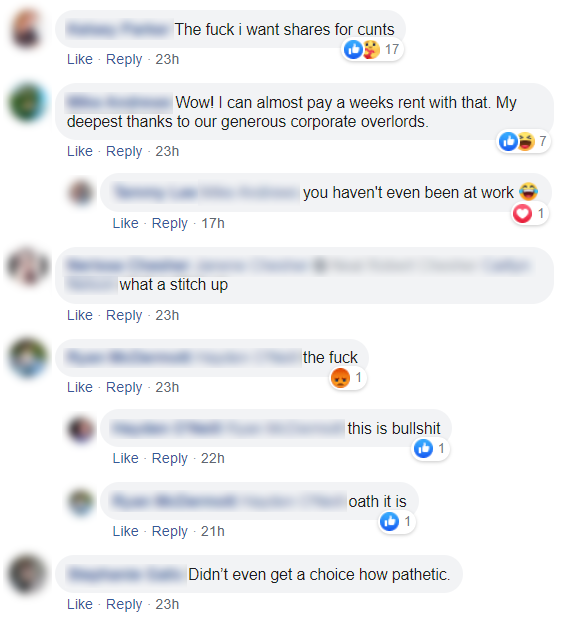
Woolworths staff and one of the key unions representing them have slammed the supermarket giant’s $50 million reward offer, calling it a “slap in the face” after months of working on the front line of the pandemic.
On Tuesday, Woolworths Group CEO Brad Banducci announced the bonus scheme as an acknowledgement of the team’s crucial role in the pandemic.
Full-time employees will receive $750 worth of shares and $250 in store credit. Part-time employees, who make up roughly half of the eligible workforce, will receive the $250 store credit and shares based on how many hours they work.
However, casual workers, who make up just under half of the workforce, will only receive a $100 store credit and no shares, while workers employed after March 1 – specifically in response to increased demands due to the pandemic – will receive nothing.
Staff feel ripped off, exploited, and frustrated at the glowing press Woolies received for its scheme.
“Woolies was in a position where it absolutely did have to give its staff something,” a 28-year-old part-time supermarket worker told PEDESTRIAN.TV.
“What they did was the absolute bare minimum that they had to do, and therefore made themselves look good in the process.
“It was a slap in the face.
“We’ve had to deal with unprecedented amounts of customers, we’ve had to deal with the panic buying which generated gigantic profits, we’ve been put in a potentially unsafe environment, and then we’re given this compensation, which is just funneling money back into the company which did not do enough during this whole process.”
He said the past few months have been “one of the most brutally anxiety-inducing experiences” he and his coworkers have ever experienced during his 12 years at the supermarket.

Casual employees who’ll only get $100 in store credit are feeling even more ripped off.
“They’re basically saying casual workers do less than part-timers and full-timers, so they deserve less,” a 20-year-old casual at Big W told P.TV.
“I couldn’t see my grandparents for three months because I was working in retail [and coming into contact with hundreds of customers], so my health and my family’s health was only worth $100?”
The worker, who has been at the same store for seven years, said the months since the pandemic stared were as busy as Christmas, with the only key difference being signs asking customers to keep their distance from one another
She said she felt disappointed by the company’s hygiene policy for staff members.
“Why would we want to put more money back into the company that’s not even doing the right thing by us?” she added. (A Woolworths spokesperson told P.TV a “range” of enhanced hygiene measures, including forced customer limits and plexiglass screens, had been introduced, and that the supermarket would continue to “invest” in these measures for “as long as we need”.)
On social media, hundreds more Woolies employees have also lashed out at the payment.
One user posted: “Initial demands were for $5 a hour more and considering the amount of extra hours staff have worked and the prolonged nature of COVID-19, this feels like a cop out.”

The deal’s been welcomed by the Shop, Distributive and Allied Employees Association (SDA), a union which many Woolies staff belong to, including the two employees P.TV spoke with.
However, another union representing Woolies staff, the Retail and Fast Food Workers Union (RAFFWU), has slammed the scheme as a “slight of hand” to avoid paying proper living wages.
“In mid-March we raised the concern that during the panic buying associated with the pandemic our members, deemed essential workers, were actually being paid less than a living wage,” RAFFWU Secretary Josh Cullinan told P.TV.
Shortly after, the SDA launched its hazard pay campaign, which RAFFWU says distracted from their calls for a living wage of $25 per hour.
“We think it lets employers off the hook of a permanent living wage. At the moment the base rate at Woolworths is between $10 (for very young workers) and $22.50 per hour,” Cullinan added.
“A gift card is not the same as wages and in no way properly compensates a legion – over 100,000 workers – who have worked tirelessly and helped Woolworths Group secure massive windfall profits during panic buying.”

The SDA defended the gift cards in an email to members, saying “this kind of payment minimises any tax you have to pay”, despite many part-time and casual staff earning below the tax threshold anyway.
The part-time Woolies staff member even wrote to the SDA to explain his frustration.
“You’re telling me a multi-billion dollar company which profited directly off of panic buying couldn’t even afford to shell out that base amount to its employees in cash?” he wrote.
“It reeks of the selfish ‘bare minimum’ attitude that the Woolworths Group has become known for amongst its ‘team’.”
However, he feels as if his complaints have fallen upon deaf ears and has not received a response by time of publication. The SDA also didn’t respond to P.TV’s requests for comment.

Woolworths Group said its scheme will result in the largest number of shareholder team members in the Australian and New Zealand markets.
“The awarding of shares is not only recognition for our team’s efforts over the last year, but also acknowledgement that our team has a critical role to play going forward as we all adjust to the new normal,” Banducci said.
“We could think of no better way to thank and recognise our team than by making them shareholders in our Group.”
Despite not being eligible for the shares or store credit, casual team members who joined the group after March 1 will still be entitled to their team discount of 5-10% until the end of 2020, regardless of whether or not they are still employed by the company.
Just last year, the company admitted it had underpaid employees $315 million over the past decade. It is still processing backpayments for those workers, even while it gets positive press for handing out shares and store credit.
As essential workers keep putting their health and wellness on the line, more companies will likely be expected to pay staff some kind of compensation for their sacrifices in future.
What’s clear is that employees now want a say in how that’s paid out.



